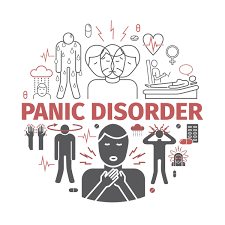Understanding What is Panic Disorder
What is panic disorder? Panic disorder is a mental health condition characterized by recurrent and unexpected panic attacks. These intense episodes of fear or discomfort can strike suddenly, often without any clear reason, and lead to significant physical and emotional distress. To fully grasp what is panic disorder, it’s essential to recognize its symptoms, explore its potential causes, and learn effective strategies for managing and coping with this condition.

Symptoms of Panic Disorder
Panic attacks are abrupt periods of intense fear or discomfort that peak within minutes. They can be overwhelming and distressing, leading to various physical and psychological symptoms, including:
- Heart Palpitations: A racing or pounding heart, often described as a feeling of “heart racing.”
- Sweating: Excessive perspiration, which can occur even in cool or comfortable environments.
- Shaking: Uncontrolled trembling or shaking, particularly in the hands or legs.
- Shortness of Breath: Difficulty breathing, feeling smothered, or as if one cannot get enough air.
- Chest Pain: Discomfort or pain in the chest area, which may feel sharp or aching.
- Nausea: An upset stomach or feeling sick, which can sometimes lead to vomiting.
- Dizziness: Lightheadedness or a sensation of being faint, which may lead to feeling unsteady.
- Numbness: Tingling or numb sensations, often in the hands, feet, or other extremities.
- Fear of Losing Control: An overwhelming sense of impending doom or fear of losing control, which can be frightening.
These symptoms can be so intense that they mimic those of other serious medical conditions, leading individuals to seek immediate medical attention.
For Best Doctor Consultancy Visit:
Dr. Sugandha Gupta
Dr. Paramjeet Singh
Causes of Panic Disorder
The exact cause of panic disorder is not fully understood, but various factors may contribute to its development:
- Genetic Factors: There may be a genetic predisposition to anxiety disorders, including panic disorder. Family history of anxiety or related disorders can increase the likelihood of developing panic disorder.
- Brain Chemistry: Imbalances in brain chemicals and neurotransmitters, such as serotonin and norepinephrine, are thought to play a role in the onset of panic attacks. These imbalances can affect mood regulation and anxiety levels.
- Stress: High levels of stress or traumatic experiences can trigger the onset of panic disorder. Major life changes, such as moving, job loss, or relationship difficulties, can contribute to heightened anxiety and panic.
- Personality Traits: Individuals with certain personality traits, such as high sensitivity to stress or a tendency toward anxiety, may be more vulnerable to developing panic disorder. A history of childhood adversity or high levels of perfectionism can also be risk factors.
Coping Strategies and Management
Managing panic disorder involves a combination of strategies and techniques designed to reduce the frequency and intensity of panic attacks. Effective approaches include:
- Cognitive-Behavioral Therapy (CBT): CBT is a widely recognized approach that helps individuals identify and challenge negative thought patterns and behaviors associated with panic attacks. By changing these patterns, CBT can help reduce the frequency and severity of panic attacks. Learn more about CBT from Psychology Today.
- Mindfulness and Relaxation Techniques: Practices such as mindfulness meditation, deep breathing exercises, and progressive muscle relaxation can help calm the mind and body during a panic attack. These techniques promote relaxation and reduce overall anxiety levels.
- Regular Exercise: Engaging in regular physical activity can improve overall mental health and reduce anxiety. Exercise releases endorphins, which are natural mood elevators and can help counteract feelings of anxiety and stress.
- Healthy Lifestyle Choices: Adopting a balanced diet, ensuring adequate sleep, and avoiding excessive caffeine and alcohol can help manage anxiety and reduce the likelihood of panic attacks. A healthy lifestyle supports overall well-being and mental health.
- Support Groups: Connecting with others who experience similar challenges through support groups can provide comfort and understanding. Sharing experiences and strategies for managing panic disorder can be beneficial and reduce feelings of isolation.
For more information on coping strategies, visit our internal resources at Delhi Mind Clinic.
When to Seek Professional Help
If panic attacks are frequent, severe, or significantly impact daily life, seeking professional help is crucial. A mental health professional can provide a comprehensive evaluation, diagnose panic disorder, and develop a tailored treatment plan. Therapy, combined with lifestyle adjustments and support, can help individuals manage their symptoms effectively and improve their quality of life. Learn more about managing stress and mental health from Psychology Today.
Conclusion
Panic disorder is a challenging condition that affects many aspects of life. By understanding what is panic disorder, its symptoms, potential causes, and effective coping strategies, individuals can take proactive steps toward managing their condition. With appropriate support and treatment, those with panic disorder can lead fulfilling lives and gain control over their symptoms. For more information, visit Delhi Mind Clinic.

